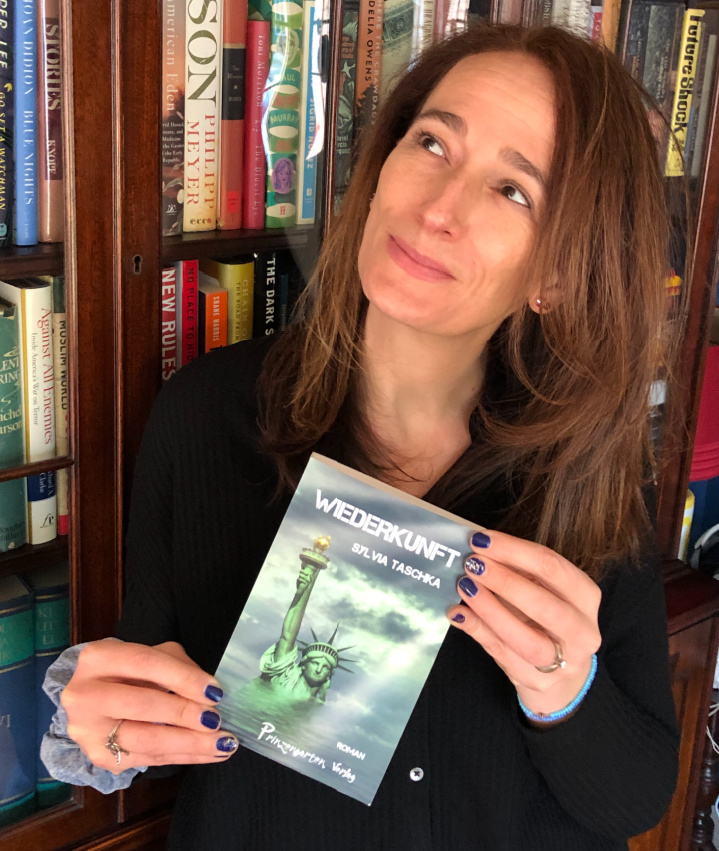
Wayne State Associate Professor of Teaching Sylvia Taschka teaches and studies history but is often asked what the future holds based on her expertise.
Taschka admits she can’t predict the future, but using her knowledge of history and her passion for creative writing, she wrote the novel Wiederkunft in her native German, which translates to “the second coming.”
“I’m interested in dystopian work and urban fantasy, and I wanted to connect some of what I do as a historian to that part of me,” Taschka said. “In the book, I’ve envisioned how some political conflicts that are happening right now might play out in the future. It’s 180 years in the future, and the United States as it is today no longer exists. There’s been a major climate catastrophe and a secession where you have Northern America, which is a mix of the United States and Canada, and a so-called “Great America.” My observations as a historian influenced what I imagined in the book.”
Taschka’s recent research on environmentalism and climate change also helped inspire the novel. The main character is a “brilliant climatologist” who is dealing with an unstable society navigating climate disaster.
“I’ve always been interested in raising awareness about climate change and pushing for political and other economic solutions to prevent the worst from happening,” Taschka said. “That was definitely a strong influence in the book, which is partially a warning. It can also be seen as encouragement to activists because many of them might have a feeling of hopelessness, and some might even wonder if it is even worth it to fight for humanity. That’s the main question of the book’s protagonist: ‘Does humanity even deserve to survive? And if yes, what part should she play?’”
Wiederkunft is Taschka’s first novel. She also writes poetry and even won second prize in a national competition in Germany for her poem “Eine pandemische Poesie,” which was inspired by the start of the coronavirus pandemic. But Taschka’s ultimate goal was to write a book of fiction.
“This has long been a dream of mine and was always something on my bucket list,” Taschka said. “I always knew I would love to write a novel. I’d written poetry and some short stories, but I was always looking for an idea for a novel. Early one summer, I woke up one morning and all of a sudden had the idea for the first scene in my head. I just started writing and wrote almost the first 100 pages that summer. Things slowed down when I went back to teaching, but once I had the idea, I stuck with it.”
Taschka said she chose to write the novel in German because it’s easier for her to write creatively in her native language.
“I write articles for newspapers or internet publications about history, and that writing comes very natural to me in English, but when it comes to creative writing, I am more creative in German,” she said. “It’s only in the last two or three years that I’ve started writing poetry in English.”
Taschka noted that it depends how the book sells if it will be translated to English one day, but there are currently no plans.
“My publisher is really happy with how the book is selling,” she said. “It’s a small publishing house. The first review by a German blogger was very positive. It’s doing well so far.”
Creative writing is a passion for Taschka, but she still enjoys studying and teaching history — something she’s done since a young age.
“As a German, what really got me interested in history was finding out about the horrible things that happened in the past in Germany,” said Taschka, whose expertise is Nazi Germany and German-American relations. “I began to ask questions, and ever since then, I could not stop.
“That’s really something that keeps me going as a historian and as a teacher,” she continued, “the idea that you have to confront your past and talk about it and try to understand it and, in this case, try to prevent it from ever happening again.”
Taschka’s husband is Wayne State Professor of History Andrew Port. They met in Germany when Port was doing research. Port started working at Wayne State before Taschka joined him, and both have been happy teaching history in Detroit ever since.
“I always come across students at Wayne State who have a real thirst for knowledge and want to exchange ideas,” Taschka said. “I taught a class on the history of terrorism last year, and it was such an engaged group of students. There were very intense discussions — also private conversations with students who really wanted to talk about the material. When teaching goes well like that, when there are some really intense exchanges, I really, really enjoy that. The interactive aspect of teaching is my favorite part of my job.”
